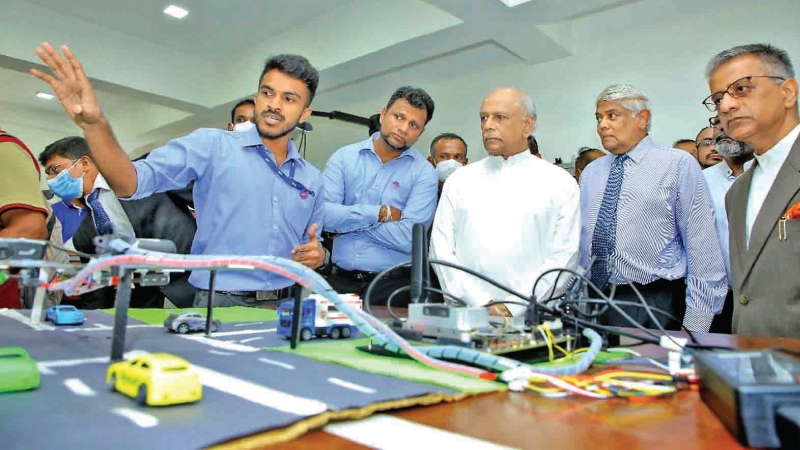Prime Minister Dinesh Gunawardena and Indian High Commissioner Gopal Baglay jointly witnessed the establishment of partnership linkage between the Sri Lanka Technological Campus (SLTC) Research University and the Indian Institute of Technology – Madras (IITM) for an inclusive partnership for academic, research and resource exchange.
During their visit to the SLTC in Padukka on Wednesday, they joined a zoom meeting between the SLTC Campus and IIT, Madras in which the Founder President/CEO of SLTC Dr. Ranjit Rubasinghe welcomed them from Australia, where he is currently on an official visit.
The SLTC Research University partnered with the Indian Institute of Technology Madras entered into a Memorandum of Understanding (MoU) to further their contribution towards education and research along with widening provision for staff and student exchange programmes.
As the Indian IITs have made a high reputation as a premier university that produces top IT specialists to the world, the SLTC will immensely benefit from its collaboration as an institute that has proven its high potential. The partnership is expected to strengthen each institution’s contribution towards higher education and research on a global scale. The agreement unfolds several opportunities for student and staff exchange programmes.
The lecturers and students of SLTC demonstrated to the Prime Minister and the High Commissioner how they could use the state of the art technological tools such as cloud application systems for the students to link to four stations simultaneously and interact with lecturers and students and work on their own initiatives.
Two students explained their latest project to convert discarded cooking oil to diesel to run motor vehicles. They explained this innovative method could be used commercially and save at least a small portion of the foreign exchange spent on fuel imports.
The academics of SLTC expressed confidence that the partnership with IIT Madras would provide provision for intellectual opportunities for the participants of both countries, enriching research and academic fields. The partnership paves way for the two institutes to collaborate on research and academic programmes on many fronts. It will open doors for the students to wide opportunities through a spectrum of collaborative axes that will present multiple opportunities in education, research and intellectual exchange programmes.
The academic programmes that will be on offer are structured in a manner that will expose students to a seamless flow of knowledge, industry know-how, practical experiences and skills development, in all aspects within multiple academic streams including Information Technology and Software Engineering, amongst a host of other domains.
Dr. Nanda Gunawardane -Director/International Affairs at SLTC, said that the Campus is currently working on a broad programme to train youths with high IT skills for potential employment in Japan. It is expected to enter into an agreement with Japanese industrial groups to ensure employment for Sri Lankan youths skilled in IT and Japanese Language. “There are over 10,000 employment opportunities available,” he said.
The SLTC conducts Engineering programmes in Electronics, Telecommunications, Power Systems and Computing. Its degree programmes are accredited by the Ministry of Higher Education and Highways and recognized by the University Grants Commission.
Prime Minister Gunawardena and Indian Envoy first visited Seethawaka Botanical Garden first where they planted two saplings to mark the 75th Anniversary of India’s Independence.
Seethawaka Botanical Garden is a Wet Zone Botanical garden covering 79 acres which mainly serves as a research area and a conservation area for threatened and vulnerable endemic plant species in the Sinharaja Rain Forest region.
Seethawaka Botanical Garden is a Wet Zone Botanical garden covering 79 acres which mainly serves as a research area and a conservation area for threatened and vulnerable endemic plant species in the Sinharaja Rain Forest region.
 |
| Prime Minister Gunawardena and the Indian Envoy during their visit to the Seethawaka Botanical Garden. |
Speaking on the occasion, Indian High Commissioner said, it is a privilege to recall the great relationship between the two countries, to recall our great history and to recall with gratitude the people like the honourable father (Philip Gunawardena) of the Prime Minister who have strengthen that great relationships. “As I do that I am also mindful of the future that we have to work for and the present in which we are combined with our joint efforts to not only promote our economic partnerships but also to create environment-friendly policies which fight against the Climate Change. The promotion of green policies, green energy, and the promotion of renewable energy are some of those areas in which India is very happy to partner very closely with our friends and colleagues in Sri Lanka under the guidance of Sri Lankan leadership,” he said.
The Prime Minister stated, “The Indo-Sri Lankan friendship is not limited to a few years. It spans over many centuries. Bilateral relations between the two countries have become stronger every time. By this year, India has become one of the most powerful countries in the world. Prime Minister Narendra Modi as the current Chairman of the G20 group granted numerous benefits to the neighbouring countries as well.”
“Environment is not limited to one generation. It is everyone’s responsibility to protect such botanical gardens full of biodiversity. The kingdom of Seethawaka played a special role in the country’s freedom struggle. The nature of this unique environment also had triggered it, he said.
The Indian High Commissioner Gopal Baglay revealed that India’s support for Sri Lanka’s green development process is deserved. The relations between the two countries are not limited to economic cooperation. India’s full support is given to Sri Lanka in the programme of promoting renewable energy.
The High Commissioner highlighted the need to promote economic partnership between the two countries and work with the joint efforts of both countries to create environment-friendly policies that combat Climate Change.”


